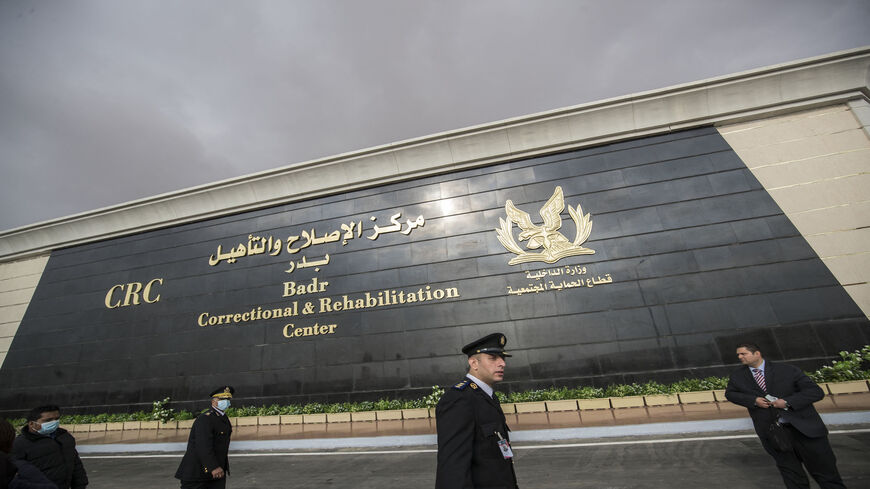A number of political activists in Egyptian prisons have been on a hunger strike for several days to protest their denial of basic rights, at a time the president has called for a national dialogue with opponents.

The Correctional and Rehabilitation Center in Badr city is seen during a government-guided tour for the media, east of Cairo, Egypt, Jan. 16, 2022. - Khaled Desouki/AFP via Getty Images
A correspondent in Egypt
May 24, 2022
CAIRO — A number of political activists and dissidents detained in Egyptian prisons have been on a hunger strike for several days now in protest against their ongoing unlawful detention for long and illegal periods. They are also protesting the denial of their basic rights in prisons, including regular visits, exercise time outside their cells and access to books, their families and lawyers told Al-Monitor.
In February, 12 detainees in Egyptian jails began a hunger strike in protest against their pre-trial detention that exceeded the legal limit of two years as stipulated by law. These include political activist Abdel Rahman Tarek; Galal al-Behairy, a poet who has been in pre-trial detention for three years; and political activist Ahmed Maher, who headed the media office of Gen. Sami Anan, Egypt's former military chief of staff and presidential candidate in 2018.
Another one of the detainees who had begun the hunger strike — Walid Shawky, a physician and leading figure of the opposition April 6 Youth Movement — was released in April as part of a presidential pardon.
Sarah Tarek, the sister of Abdel Rahman Tarek, told Al-Monitor that she fears for the life of her brother who has been in pre-trial detention for more than 2½ years, in poor conditions and in the absence of real charges or a fair trial. His imprisonment was based on the findings of the National Security Agency’s investigations, accusing him of belonging to a terrorist group and spreading false news, she said.
She noted that her brother was arrested in September 2019 while serving the terms of his probation after completing a prison sentence for a case dating back to 2013. She said Tarek disappeared for several days before reappearing at the state security prosecution in 2019. Since then, the court ordered his release twice, but he would each time be rearrested in a new case, she added.
In 2013, a criminal court sentenced Tarek to five years in prison, followed by a daily judicial observation session (probation) of 12 hours.
Alaa Abdel-Fattah, a prominent political activist who has British citizenship, has been on an open-ended hunger strike for 50 days now, demanding his basic rights, including family visits without being physically separated by a glass barrier, exercise time outside his cell, and access to books.
His family has repeatedly raised concerns over his deteriorating health as the hospital at the Tora prison complex where he is held is unequipped for treating prolonged hunger strikes.
Laila Sweif, Abdel-Fattah’s mother, told Al-Monitor by phone that her son “was transferred a few days ago from Cairo’s Tora maximum-security prison complex to Wadi el-Natrun prison, following several requests in which we denounced violations he was subject to and very poor imprisonment conditions he lived under since he was detained.”
She added, “Apparently, the imprisonment conditions in the new prison are relatively good compared to the previous one. But Alaa is still on a hunger strike and we really fear for his life, particularly since the prison administration refuses to document the hunger strike in its official records. As long as his hunger strike is not documented by the prison authorities, it means that he is not on hunger strike according to the law. We hope for better conditions and that the [prison administration] meets his demands.”
Sweif, professor at Cairo University and member of the March 9 Movement for the independence of universities, which calls for the noninterference of politics in Egyptian universities, said she had “submitted a missive April 5 to the Egyptian attorney general, the highest legal authority in Egypt, to have Alaa’s demands met, most notably to allow the British Embassy to visit him in prison since he holds British citizenship. Yet we have not received any reply and Alaa is still on a hunger strike, which poses a real threat to his deteriorating health.”
The ongoing hunger strikes among political prisoners come as Egyptian President Abdel Fattah al-Sisi called April 26 for a national dialogue with all opposition political forces and civil society groups.
Yet the political forces and parties stressed the need to release all political detainees and prisoners of conscience and to close the file of unlawful prolonged pre-trial detentions before engaging in any national dialogue or speaking of a new political period, at a time when the regime’s opponents are accused of belonging to terrorist groups.
No comments:
Post a Comment